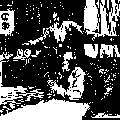40. A Great Mistake
"The lamp burns low, and through the casement bars Grey morning glimmers feebly. " —BROWNING. "The great Columbus of the heavens,"—so they called Copernicus, the man who about this time discovered as much about the heavens as Columbus had discovered about the earth. For he found that for all these hundreds of years the whole world had been labouring under a wrong idea about the relation of the earth to the sun,—that the wise and clever men of the past had made a great mistake.
Let us see how this man, Copernicus, discovered the truth.
He was born in distant Poland in the year 1473, just about the time when Prince Henry was busy sending out his Portuguese ships into the Sea of Darkness to find the Cape of Good Hope. When he died—an old man of seventy—Vasco da Gama had found the route to India by the Cape, Columbus had discovered America, Balboa had seen the Pacific Ocean, Magellan had sailed round the world, Cortes had conquered Mexico, and Pizarro had conquered Peru. Men were stretching out their hands for a new earth. This man was to show them a new heaven.
As a boy, Copernicus showed great taste for mathematics and astronomy; and such was his ability that he was sent to Rome to lecture on the stars to the students there. But he soon returned to his home in Poland, for he wished to learn more of the sun, moon, and stars, and to have plenty of time for quiet study. The old astronomers told him that the earth was fixed and motionless, while the sun, moon, and stars moved right round her once every twenty-four hours. In this way they accounted for the changes of night and day, darkness and light.
But this theory did not satisfy Copernicus at all. He was convinced that the old astronomers were wrong. And yet it seemed almost easier to believe that he himself was wrong than that all the clever men who had lived before him had made such a mistake. He worked on and on, pondering, observing, making instruments to try and learn more about the heavenly bodies. At last one day there flashed into his mind this idea. Was it possible that the earth was not fixed and motionless after all? Could it be that the earth moved round the sun, and the sun did not move round the earth?
There was an old Greek philosopher who had lived twenty centuries before, and he had hinted that this was the case. Eagerly Copernicus turned to the old Greek writings. With breathless interest he read again of this suggestion that the earth was not fixed, but moving. Feverishly he worked out his observations on this new theory. It is impossible to imagine the amazement and wonder that filled his mind at the discovery of what is to us to-day a well-known fact. We know now that day and night are caused by the earth revolving on its own axis, turning first one side to the sun and then the other; that the earth, apparently so still and motionless beneath our feet, is really moving round and round at a pace that no train can touch for speed.
As this fact burst on the mind of Copernicus, he was awestruck.
He did not make known his discovery at once: he went on working as before, until he became more and more certain that he was right.
When at last he proclaimed his discovery, he was simply laughed at.
As Columbus had been ridiculed for suggesting that the world was round as he stood before the King and Queen of Spain, so Copernicus was scoffed at for his suggestion that the earth moved round the sun.
"He is suffering from delusions of too childish a character," cried his friends. "Think how absurd a jest,— That neither heavens nor stars do turn at all, Nor dance about this great round Earthy Ball, But the Earth itself, this massy globe of ours, Turns round but once every twice twelve hours. " So scoffed the poets at the man who had toiled for thirty-six long years at his theory before he gave it to the world.
Fortunately some believed in him, and persuaded him to write a book about it. While he sat day after day writing his book, he suffered many things from ignorant folk, who looked with horror on this man who affirmed that the earth was moving. When at last it was finished Copernicus was an old man, worn out with work, anxiety, and pain. One of his faithful disciples took the precious manuscript to a printing-press at Nuremberg.
But when it became known that the book was actually being printed, all the ignorance and jealousy of his countrymen burst forth. Men tried to get at the press to destroy the book. The printers worked with a loaded pistol ready at their side, while two faithful friends guarded the manuscript day and night.
The excitement of the author was intense: it utterly broke him down. He became very ill, and it was feared that he would never see his book in print. It was the 23rd of May 1543. Copernicus was sinking rapidly. Silence reigned in the sick-room, where he lay dying. His book had not come.
Suddenly the flicker of a smile lit up the old man's face. The sound of a horse's hoofs was coming nearer and ever nearer. Another minute and the printed book containing his life's work was gently laid in his almost nerveless hands. His wasted fingers grasped the volume for which he had longed and waited. He had not lived his life in vain. Sinking back with a deep sigh of satisfaction, he murmured faintly the pathetic words, only caught by those near him: "Lord, now lettest thou thy servant depart in peace. "

